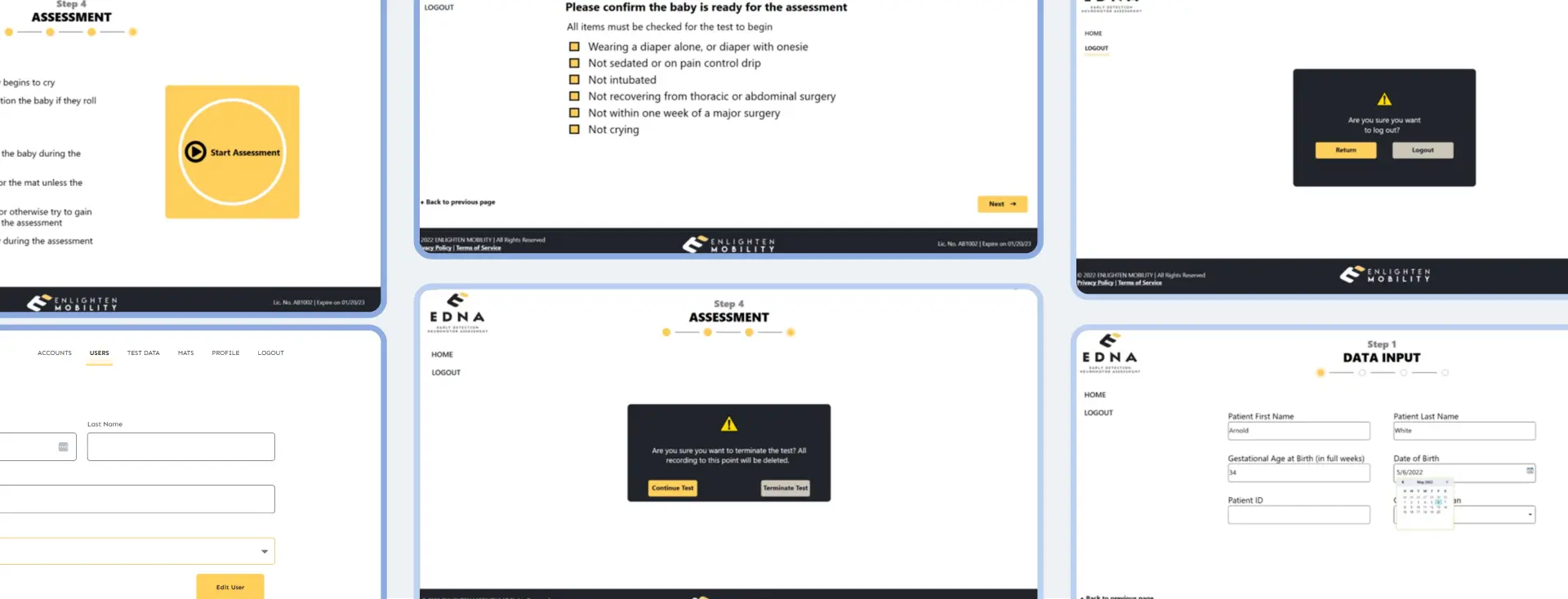
Key Takeaways
Goodyear sought a cost-effective tread analysis tool for fleet managers.
They partnered with Biners to test the ability of smartphone imaging.
Biners developed a Proof of Concept in 12 weeks.
The AI and machine learning solution achieved all goals.
The Challenge
Enlighten Mobility is a medical device company that provides early intervention solutions centered on mobility loss and neuromuscular diseases. The healthcare company developed GMat, a first-of-its-kind medical device that provides automated, noninvasive neuromotor screening for newborns.
The test takes only three minutes, yet it allows physicians to catch neuromotor dysfunction immediately after birth rather than years later when symptoms begin to surface.
The client had an AI solution that used a machine learning algorithm to analyze the raw data from the GMat. They needed a desktop application to interface with the hardware, capture data, and generate a report with the test details and results. They also needed a cloud-based web application to store the reports, as well as set up and manage user accounts.
The Solution
Working closely with the client, the Biners team developed the Early Detection Neuromotor Assessment (EDNA) desktop and corresponding web applications.
EDNA connects to the GMat via Bluetooth. When a diagnostician places an infant on the sensor mat, EDNA measures the child’s movements via the GMat’s pressure sensors, taking a reading every second for three minutes.
The software converts the data to an Excel file and sends it to the Python AI application for analysis. The AI responds with either “detected” or “not detected.” EDNA generates a PDF report that includes the patient’s information and the test result.
The desktop app sends the anonymized data to the web application for storage in the cloud. The web application is also used to create user accounts and set permissions based on their role.
The Biners team built the EDNA desktop app using the Windows Presentation Foundation (WPF). They developed the web application using Angular 13 for the front-end and .Net 6 and EF Core for the back-end. The database was built on PostgreSQL.
Although the client provided the GMat hardware to our US team, the India team developed the software. This meant coordinating testing between the two teams.
Midway through development, the client pivoted to a new hardware vendor. Thanks to Biners’s agile, iterative development process, the team made the necessary changes quickly.
When it came time to test the applications, the QA team had to get creative. Without a real infant to test with, they placed water bottles on the GMat as a stand-in. This workaround only returned a “not detected” result. The client’s later internal testing confirmed that the application returned a “detected” result when dysfunction was present.

The Results
Throughout the project, our team maintained close and efficient communication with the client’s team. We delivered the first iteration of both applications in just five months.
“The right people were always in the conversation,” said Adrian Rodriguez, Co-founder and Head of Product Development at Enlighten Mobility. “The people who did not need to be in the conversation were left out.” He also appreciated that we were quick to move, adaptable, and flexible.
EDNA is the first automated, noninvasive neuromotor screening for newborns. EDNA interfaces with the GMat to collect newborns’ 3D motion and uses artificial intelligence to detect patterns of variability that the human eye and brain cannot process.
These improvements have included integrating a Azure DK camera into the system to enhance its diagnostic capabilities. We also migrated the solution from the cloud to work locally on the desktop. Finally, we are assisting AngelEye in submitting EDNA for FDA approval as a Class 1 medical device.
From the initial concept discussions to the final implementation, Biners's dedication to excellence has been truly remarkable. The creative designs, intuitive user interface, and seamless user experience the Biners team crafted have exceeded my expectations.

Sami Ghameka
CEO & Co-Founder, CookinGenie


